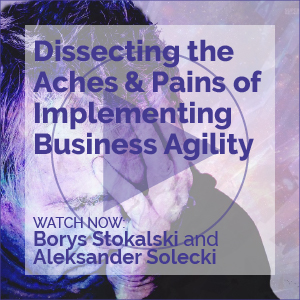Pay Me Now Or ....
Decisions, decisions. Should we disclose it or should we hide it? If we disclose it, our reputation might be hurt. Then we might risk losing business. Our customers might avoid us or turn to someone else for their needs. On the other hand, if we hide it, we might be able to fix the problem before anyone is the wiser. Then life will return as if nothing happened.
A Real-Time War
A Real-Time War
The Impact of Sagent's Sale to Group 1
Four Strategies for Dealing with Burnout
Project Execution
Software Risk Management Important for Achieving Success
In a recent study by Cutter Consortium, 24% of respondents reported that they think their organization believes software risk management is very useful and effective, 46% think that it is somewhat useful or effective, 14% think that it is not very useful or effective, and 16% say that their organization has not yet made a determination about the usefulness of software risk management.
Buying the Right Web Services Solution (and Vendor) for Right Now
UML 2.0
The Object Management Group (OMG) Technical Committee met in Orlando, Florida, USA, in the last week in March and completed most of UML 2.0.
Components: Types of Behavior
Virtual Databases and Business Intelligence
Several readers have written lately asking me to comment on the use of "virtual databases." Consequently, I've decided to make it the focus of this week's Advisor. First, I will examine virtual database technology in general and then move on to discuss its role regarding data warehousing and BI.
Portfolio Management
Revisiting the Definition of Agility
When Less Is Always More
Just so there's no misunderstanding here, there's no question that computing environments that have less, rather than more, variation will save money and increase efficiency. Or put another way, you have a choice here: you can be sane or insane. Here are some questions to ponder:
When Less Is Always More
Just so there's no misunderstanding here, there's no question that computing environments that have less, rather than more, variation will save money and increase efficiency. Or put another way, you have a choice here: you can be sane or insane. Here are some questions to ponder:
Who Are These People?
Let's talk about people -- and let's be very honest with each other.
The Culture Gulf and Its Consequences
Strategic Technology a Shock to IT
Strategic initiatives are one of the few tools senior executives have for guiding a corporation. Unfortunately, when it comes to strategic initiatives, most organizations perceive IT as not only a necessary evil, but sometimes as an outright barrier to implementing their initiative. IT's response to initiatives is generally perceived as slow, expensive, and marginally effective.
Real-Time War Exposes Real Time's Limitations
So much gibberish is being generated about the "real-time enterprise" that the IT manager practically needs wings to stay above it. The truth of the matter is that "real-time" information has its limitations, which the war in Iraq illustrates perfectly.
Real-Time War Exposes Real Time's Limitations
So much gibberish is being generated about the "real-time enterprise" that the IT manager practically needs wings to stay above it. The truth of the matter is that "real-time" information has its limitations, which the war in Iraq illustrates perfectly.
Implementing Global Sourcing
Introduction to Operational Risk Management
Over the years, operational risk management activities have evolved from simple information gathering to a functional discipline with dedicated staff using established formal policies and procedures.


